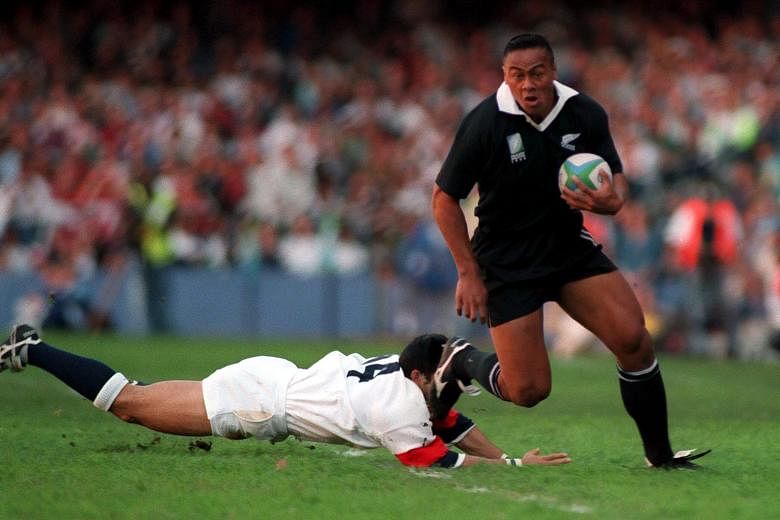WELLINGTON • New Zealand rugby legend Jonah Lomu, who revolutionised wing play to become the sport's first global superstar, died yesterday at the age of 40, prompting a global outpouring of grief.
Lomu had suffered from kidney disease for two decades and had a transplant in 2004, but former All Blacks doctor John Mayhew said his death was a complete shock.
"It was totally unexpected," Mayhew said. "Jonah and his family arrived back from the United Kingdom last night and he suddenly died this morning."
Lomu, who was awaiting another transplant and undergoing dialysis treatment, had undertaken commercial obligations at the recent Rugby World Cup in England, won by New Zealand.
His death in Auckland took the rugby-mad country by surprise and triggered a flood of messages of condolence from around the world. New Zealand's Parliament expressed its sorrow before they began proceedings yesterday.
"Anyone who was living in New Zealand in the 1990s would not have failed to notice the massive impact Jonah Lomu had not only on sports fans but the wider community in this country," Sports Minister Jonathan Coleman said.
World Rugby chairman Bernard Lapasset led the international tributes, saying: "He was the first superstar player and, through his sheer brilliance and love of the game, he brought much joy to the rugby family and took our sport to a new level of profile."
Lomu's record of 37 tries in 63 Tests was an impressive haul, all the more considering he played much of his career with nephritic syndrome, the disease that attacked his kidneys.
New Zealand Rugby, which arguably owes part of its huge commercial success over the last 20 years to his performances at the 1995 World Cup, said it was "shocked and saddened" by his death.
"I think it's fair to say that his bursting onto the international stage took the game to another level," said chief executive Steve Tew.
Born to Tongan parents in South Auckland, Lomu spent some of his childhood back in the Pacific Island nation after a cousin was hacked to death in a street attack.
He was then sent to Wesley College where he quickly found his niche on the sports field and was timed running under 11 seconds in the 100 metres.
All Blacks coach Laurie Mains plucked him out of sevens rugby in 1994 but Lomu found his transition from the loose forward position he played at secondary school to the wing a challenge.
He was dropped after his first two Tests against France in 1994 and barely made the Rugby World Cup squad for South Africa the following year after being deemed not fit enough for the fast-paced game the coach wanted to play.
He proved almost unstoppable at the tournament, however, electrifying the rugby world with seven tries - four in the semi-final against England alone, including one when he trampled over full-back Mike Catt that left many speechless.
The pace and power displayed by the 1.96m and 119kg Lomu changed the wing position forever, with the traditional lightweight flyer gradually all but disappearing from the Test game.
The ravages of Lomu's disease soon begun to affect him and his performances went downhill from 1998, although he still made the 1999 World Cup squad and scored eight tries. He played his last Test against Wales in 2002.
International Olympic Committee president Thomas Bach said: "He was an icon not just for New Zealand fans but for all rugby fans around the world. It is sad that he did not live to see the sport return to the Olympic Games next year in Rio de Janeiro."
REUTERS, AGENCE FRANCE-PRESSE


